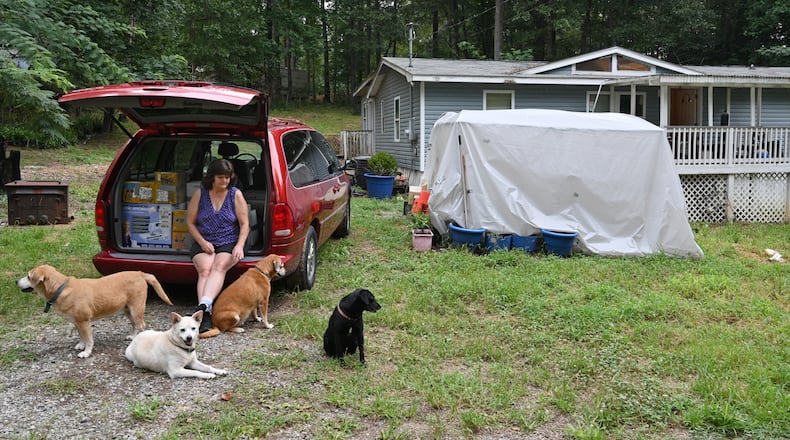Editor’s note: This article has been updated to include Tuesday’s announcement of a new moratorium on evictions.
Stephanie Brockington scrambled to pull together enough money to pay rent for her Fulton County home when she was furloughed from her restaurant job because of the pandemic.
The 39-year-old woman, who’s also enrolled in college, turned to her ex-husband for a loan. She used federal stimulus checks. Still, she fell behind on the $1,500 a month payments.
Brockington found herself relying on a federal ban on evictions to keep her and her children in the house. When it expired Saturday, she held her breath to see what would come next.
Across Georgia, others who relied on the eviction ban held their breaths, too.
But Tuesday, the Centers for Disease Control and Prevention announced a new moratorium that expires Oct. 3. It applies to U.S. counties with “substantial or high levels” of COVID-19. Like past eviction bans, the CDC’s action likely will be challenged in court.
Right now, about one of every five renters in Georgia is behind on rent payments, according to a survey by the Census Bureau. The pandemic triggered the loss of tens of millions of jobs around the country, and many of them have not returned or have come back with limited hours.
The eviction ban is meant to keep people off the streets and out of homeless shelters and other crowded housing conditions during the public health crisis.
Not everyone was eligible to take advantage of the last moratorium — only tenants who signed a federal eviction protection form to say they’d fallen behind on rent because of the pandemic.
But neither the prior CDC ban, nor the one imposed by the CARES Act last year, stopped evictions from proceeding in Georgia courts.
In DeKalb County, 145 writs of eviction were already scheduled to be executed when Superior Court Judge Asha Jackson signed an emergency order Friday that creates a local ban on evictions for another 60 days. Roughly 1,650 more are pending with the marshal’s office there. DeKalb officials say a cyberattack earlier this year dramatically slowed distribution of federal rental assistance.
Evictions were already queued up in other areas, too, including Fulton, Gwinnett, Cobb and Clayton counties. Though many counties didn’t carry out tenant removals during the moratoriums, a lot of landlords and property managers already had court orders in hand that would have allowed them to kick out some of those who are delinquent on rent. They were just waiting for law enforcement officers to carry out the orders.
Others have filed the legal paperwork required to evict tenants but are waiting for their day in court. Before hearings are scheduled, tenants have a week to respond. If they do, trial dates are set. But if they don’t — or if they lose at trial — they would have had a week to move out.
“These things scare me,” said Protip Biswas, vice president for homelessness at the United Way of Greater Atlanta, which has disbursed millions of dollars in rental assistance. “We really don’t know the scale of the emergency.”
If the Census Bureau survey paints an accurate picture, more than 400,000 households in metro Atlanta are behind on rent. But no one expects the number of actual evictions to even come close to that. Many tenants strike last-minute deals with landlords, borrow money for rent or raise funds in other ways.
Cathryn Marchman, chief executive of Partners for Home, a nonprofit group that coordinates the city of Atlanta’s response to homelessness, said that, even before the last ban expired, her organization was already seeing evidence that evictions are pushing people into homelessness. And it’s happening as the number of COVID-19 cases is once again surging, fueled by the highly contagious delta variant.
The group has placed more people into housing in the past six months than in a typical year, she said.
According to Princeton University’s Eviction Lab, racial minorities and women have been disproportionately affected by evictions during the pandemic.
An eviction can dog a tenant for years, crimping future choices, said Elora Raymond, an assistant professor at Georgia Tech who studies housing issues.
It can also have broader consequences for mental health, performance in school and birth weights, said Emily Lemmerman, a research specialist at the Eviction Lab.
Kathy Poland-Jones, 65, has a past eviction on her record, but managed to find a place in Canton. She lost her full-time job and took part-time work. But she hasn’t been able to keep up her payments. She got an eviction notice in June. If she loses the home, she said, she has no idea where she would go.
Still, many say, it’s important to remember that it’s not just tenants affected by the eviction moratoriums. Few landlords can stay solvent for long if they don’t collect rent.
In DeKalb, CEO Michael Thurmond acknowledged that Judge Jackson’s local moratorium would “increase the financial burden and stress on landlords, especially our mom-and-pop owners.” But he said he planned to propose at Tuesday’s county commission meeting that DeKalb’s Tenant-Landlord Assistance Coalition be allowed to pay 100% of all past-due rent up to 12 months and to increase future rent payments to three months.
Rental property owners want to negotiate — especially if there is federal money to sweeten the pot, said attorney Lynn Wilson. “And there will likely be a lot of encouragement for that from the courts,” she said.
“These owners have little incentive to evict,” she said. “Eviction is always a last resort.”
Just the backlog of cases would give tenants more time and spread the crisis over many months, she said.
“At the end of the day, what my clients want is to have an apartment rented and to have it be a profit-making asset,” Wilson said.
The number of eviction filings is always larger than actual evictions, said Kendall Bagley, spokeswoman for the Atlanta Apartment Association.
Much of the hardship could be avoided if local governments and organizations get more efficient at paying out the millions of dollars in federal rental assistance, said Mara Block, senior attorney at the Atlanta Legal Aid Society.
Even before the pandemic, advocates for the poor talked about the shortage of affordable housing in metro Atlanta. While construction of apartments was focused on the more affluent, many blue-collar and lower-income tenants were spending more than one-third of their incomes on housing — putting them on a financial tightrope.
Now, many tenants owe months of rent — too much to pay off quickly even if they land a job.
“For folks who were living hand-to-mouth before the pandemic, if they lose a job or miss a paycheck, it can spiral out of control quickly,” said Block.
Ashlee Reynolds, a single mother in Decatur, hasn’t been able to afford her rent since March. When she tried to make partial payments, the owners wouldn’t take anything but the full amount.
A receptionist in a doctor’s office, she lost her paycheck for months when the office was closed. Once she got behind on her $1,200-a-month rent, the landlord added $5 for each day she was late.
Months after her application, rental assistance money came through and an arrangement was made. The government will pay about $11,100 — 60% of her back rent, plus August and September, according to Legal Aid attorney Lindsey Siegel, who handled Reynold’s negotiations with her landlord.
Reynolds will pay the rest.
“I’ve been trying to keep a positive face for my kids,” she said. “We were just so far behind.”
Here are the steps to eviction for nonpayment:
- Landlord demands payment.
- Landlord files for eviction service, asks judge to enter order for possession.
- Tenant is served notice by a sheriff, special process server or a tacked-up notice.
- Tenant has seven days to respond or a judge orders eviction.
- If tenant files an answer, a trial date is set
- Judges often encourage mediation. But, if there’s a trial and the tenant loses, the tenant has seven days to move out.
- If the tenant doesn’t move out, landlord asks a marshal to schedule a ‘put-out’ date.
More details
- How long does it take to evict a tenant? In Georgia, compared to states with stronger protection of tenants, not long. “Pre-COVID, 28 days would be fast, but not unusual,” said Mara Block, senior attorney at the Atlanta Legal Aid Society in DeKalb County.
- What are the effects of an eviction? An eviction hurts a consumer’s credit score, which often makes borrowing money more costly. Also, many landlords will not rent to someone who has previously been evicted.
- Once an eviction has been ordered, is any further negotiation possible? Yes. A tenant and landlord can reach a new accord that legally modifies the eviction order. And, if a tenant offers payment and a landlord accepts the money, that is legally a new agreement. Lawyers say many tenants and landlords do not realize that in some jurisdictions once the landlord takes money, it may be a bar to the eviction.
___________________________________
Keep Reading
The Latest
Featured




